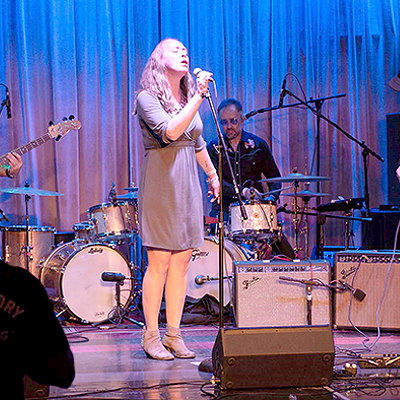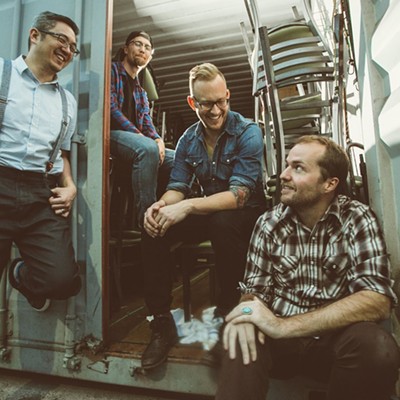He said something about how he, as a mature artist, recognizes that the immortal lyricists of Broadway musical theater would pooh-pooh such an imperfect rhyme. OK now, Webb is a great talent and all, but never have I heard such elitist hogwash. "Wichita Lineman" is a great song; he should be more embarrassed for foisting "MacArthur Park" on the world.
Although songwriting fascists would have it otherwise, there is an art to crafting a creative off-rhyme, a recognized literary technique also known as half-rhyme, slant rhyme, near rhyme and oblique rhyme.
For evidence, look no further than John Hiatt, who is--with apologies to Webb--one of the greatest songwriters of our time. And Hiatt has a way with words. He can rhyme "breeze" with "knee," "witnessed" with "kiss," "later" with "generators," "law" with "falls" and "Sheba" with "amoebas," and it works every time.
My personal favorite is from the song "Slow Turning": "Now I'm yellin' at the kids in the back / Cuz they're banging like Charlie Watts." The rhyme is close enough to make you smile; it creates wonderful imagery, and in Hiatt's drawling delivery, it sounds like heaven.
The important thing is what the lyrics say, the way they touch your heart, turn you on, drive home a point or get you all riled up. Hiatt songs do that, in their original, off-kilter way. Which is why they have been recorded by artists as respected as Eric Clapton, B.B. King, Bonnie Raitt, Rosanne Cash, Linda Ronstadt, Emmylou Harris, Willie Nelson and Buddy Guy, among others.
John Hiatt and his backing band, the Goners, will appear in Tucson Monday night at City Limits, on the heels of their recent album, Beneath This Gruff Exterior.
Hiatt's music resides at the crossroads where blues, folk, R&B, country and rock music meet up. His versatility hearkens to a time decades ago when you could hear different kinds of music on the same radio station, when music wasn't about celebrities; it was about personal stories, first-person or third-person.
Music used to be part of our folk heritage, and Hiatt is one of the few popular performers today who heroically continues that tradition while avoiding the cute compartmentalization of being "retro."
Born in Indianapolis 52 years ago, Hiatt came to the public eye during the late 1970s and early '80s, lumped in with so-called new wave songwriters such as Elvis Costello, Nick Lowe, Joe Jackson and Dave Edmunds. He also gave working as an on-contract songwriter in Nashville a go, but tired of the grind.
Early albums such as Warming Up to the Ice Age and Riding With the King sported several good tunes, but it didn't seem as if Hiatt had found his muse and true voice until the now-classic album, Bring the Family. That 1987 disc included an amazing backing band comprised of Nick Lowe on bass, Ry Cooder on guitar and Jim Keltner on drums. The musicians shared a loose groove that was polished but not pristine.
Bring the Family is one of those rare perfect albums on which not one song is a dud, not to mention the inclusion of stellar songs such as "A Thing Called Love," "Thank You Girl," "Stood Up," "Lipstick Sunset" and others.
When speaking about songwriting and the serendipitous nature of making records, Hiatt is something of a whimsical sage.
In the mid '90s, he discussed the making of his album Walk On with Rolling Stone: "I don't tend to steer a song in one direction or another. They tend to steer us. When we got together to make the record, even though I had these sort of woody, back-porch, kind of hearth-and-home, mom's-on-the-dulcimer, Grandma's-on-the-pump-organ, kind of songs, we were set to go into the studio with the Guilty Dogs, the band I had out on Perfectly Good Guitar. However, the guitar player quit two weeks before we were ready to record. So we scurried about and found Dave Immerglück (formerly of Camper Van Beethoven and Counting Crows), who came in with pedal steels and mandolins and all this stuff. So this was not a plan. But it turns out, of course, it suited the songs. So maybe there's somebody or some power looking out for us."
After that, Hiatt sort of coasted for a few years with a couple "best of" albums, his Live at Budokan and a reunion of the Bring the Family band called Little Village.
But since 2000, he's all over the place again, and the world is better for it. In the past few years, Hiatt has recorded some excellent albums of new material--the mostly acoustic folk-blues of Crossing Muddy Waters and the raucous, rocking work-out of The Tiki Bar Is Open.
For that 2001 album, Hiatt convened the Goners, which feature guitarist Sonny Landreth (who played with Hiatt back in the late '80s), drummer Kenneth Blevins and bassist Dave Ranson. The same band plays on Beneath This Gruff Exterior and will appear with Hiatt in Tucson.










